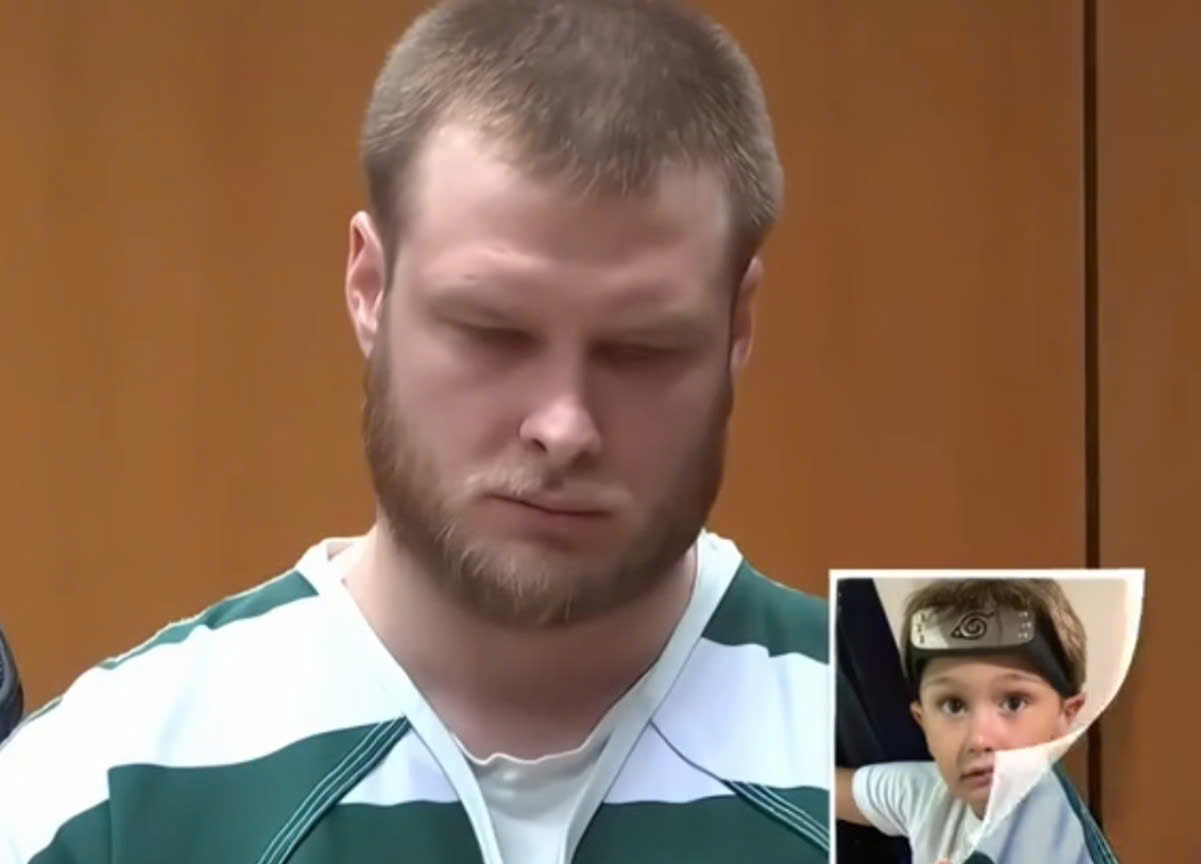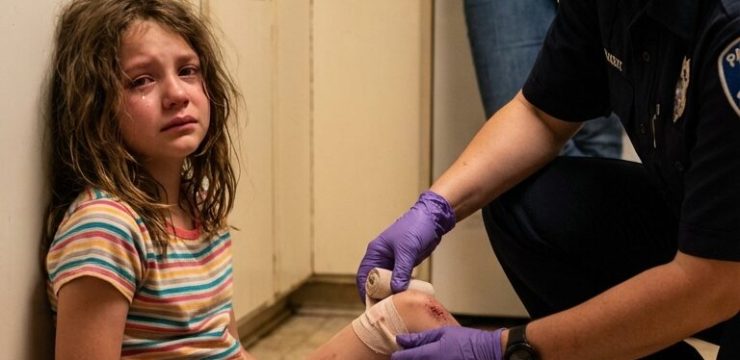At first, it seemed like a heartbreaking accident—a young boy falling off a treadmill at the gym. But what surveillance footage later revealed was something far darker and more disturbing. The incident that began as a supposed workout gone wrong soon exposed a case of shocking child abuse that left a community in disbelief and a family shattered. Now, after years of investigation and courtroom battles, a father has been sentenced to 25 years in prison for the cruel acts that ended his six-year-old son’s life.

In March 2021, inside a small fitness center in Ocean County, New Jersey, cameras captured a disturbing scene that would later serve as the central piece of evidence in one of the state’s most haunting child abuse cases. The footage showed six-year-old Corey Micciolo struggling to keep up on a treadmill set to dangerously high speeds. His father, 31-year-old Christopher Gregor, stood behind him, watching closely as the boy stumbled and fell repeatedly. Each time Corey tripped, Gregor forced him back onto the moving belt, pushing him to continue running despite the child’s visible distress. The video revealed no signs of compassion or concern—only relentless pressure and aggression.
According to investigators, Corey was forced to run far beyond his physical capacity. The treadmill incident was not a one-time mistake—it was part of a pattern of abusive “discipline” that Gregor allegedly subjected his son to. Witnesses later testified that Corey appeared fearful of his father and often complained of being tired or sore after spending time with him. In the weeks that followed the incident, the little boy began showing alarming symptoms, including nausea, fatigue, and shortness of breath.
Just days later, tragedy struck. During a diagnostic CT scan at the hospital, Corey suffered a seizure and could not be revived. His sudden death sent shockwaves through the community, and investigators immediately began looking into the circumstances surrounding his injuries. The autopsy results painted a horrifying picture: Corey had sustained blunt force trauma to his chest and abdomen—injuries that could not have been caused by a simple treadmill fall. The medical examiner determined that the damage was consistent with physical abuse, not an accident.
When authorities reviewed the gym’s surveillance footage, the truth became undeniable. The images of Corey’s final moments under his father’s control were so harrowing that even seasoned investigators were shaken. Prosecutors argued that Gregor’s behavior on that treadmill directly caused the internal injuries that led to his son’s death. What was meant to appear as “exercise” had, in fact, been cruelty caught on camera.
The trial began in early 2024 and drew widespread media attention. Prosecutors presented the footage as the cornerstone of their case, describing Gregor’s actions as “willful and reckless disregard for human life.” They argued that forcing a small child to endure such physical strain was not discipline—it was deliberate harm. The defense attempted to offer alternative explanations, suggesting that Corey may have suffered from preexisting health problems, including possible pneumonia or infection, which could have made his condition worse. They maintained that the treadmill session was not intended to hurt him and that Gregor’s actions were misguided but not malicious.
The jury listened to emotional testimony from medical experts, first responders, and, most poignantly, Corey’s mother, Breanna Micciolo. She described her son as bright, loving, and full of energy, a child who adored drawing, playing outside, and making people laugh. She spoke about her growing fear every time Corey had to spend time with his father and how her concerns were often dismissed. “I tried to protect him,” she said through tears, “but I never imagined this could happen.”
After weeks of deliberation, the jury found Christopher Gregor guilty of aggravated manslaughter and child endangerment but acquitted him of first-degree murder. It was a verdict that acknowledged the brutality of his actions while stopping short of labeling them premeditated. For many watching the case, the outcome felt bittersweet—justice served, but at an unbearable cost.
On August 2, 2024, Judge Guy P. Ryan delivered the final sentence in a somber courtroom filled with grief and anger. Gregor received 20 years in prison for aggravated manslaughter and an additional 5 years for child endangerment, to be served consecutively. Under New Jersey’s No Early Release Act, he must serve at least 85% of his sentence before being eligible for parole, meaning he will spend more than two decades behind bars.
During sentencing, Corey’s mother stood before the court once more, her voice trembling but firm. “Corey deserved love, not pain,” she said. “He trusted his father, and that trust cost him his life. No parent should ever bury their child, especially because of something like this.” Her words echoed through the courtroom, leaving many in tears. Even the judge paused before continuing, visibly moved by the depth of her grief.
In the aftermath of the verdict, the community of Ocean County has continued to mourn Corey’s loss while also calling for stronger measures to protect children from similar abuse. Advocacy groups have cited this case as a reminder that child welfare systems must act swiftly when there are signs of danger. Corey’s death, they argue, should not be in vain—it should serve as a catalyst for reform.
For those who knew him, Corey’s memory remains a symbol of innocence and resilience. His teachers remember him as curious and kindhearted, a boy who loved learning about dinosaurs and space. Friends and neighbors have since organized memorial events, dedicating playground benches and community spaces in his honor. “He was the kind of child who brought light into any room,” one neighbor said. “That light was stolen too soon.”
As for Christopher Gregor, his 25-year sentence stands as a harsh but necessary warning about the consequences of crossing the line between discipline and abuse. Legal experts have described the ruling as a clear message that cruelty toward children, especially from those entrusted with their care, will be met with the full weight of the law.
This case is a sobering reminder of how easily authority can be misused and how vital it is for bystanders to speak up when something seems wrong. While no amount of punishment can undo the suffering or bring Corey back, the conviction ensures that accountability has been served.
In the end, justice came—but it came far too late for a little boy who should still be alive today. What began as a tragedy behind closed doors became a public reckoning, exposing the hidden reality of abuse that too often goes unseen until it’s too late. For Corey’s mother and all who loved him, the sentence brings a small measure of peace. But it also carries a powerful message to parents everywhere: discipline should teach, not harm. And love, above all, should protect.





